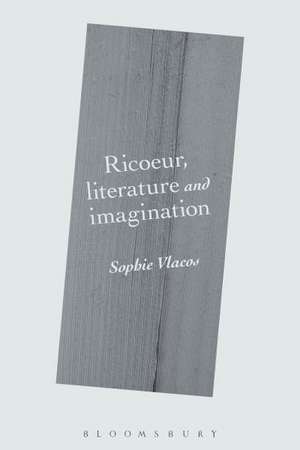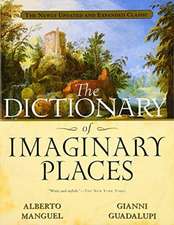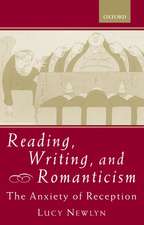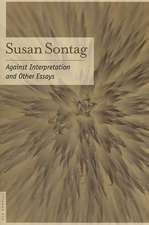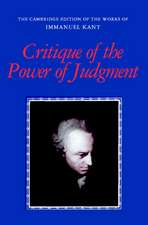Ricoeur, Literature and Imagination
Autor Dr. Sophie Vlacosen Limba Engleză Hardback – 9 apr 2014
| Toate formatele și edițiile | Preț | Express |
|---|---|---|
| Paperback (1) | 256.85 lei 6-8 săpt. | |
| Bloomsbury Publishing – 26 aug 2015 | 256.85 lei 6-8 săpt. | |
| Hardback (1) | 714.92 lei 6-8 săpt. | |
| Bloomsbury Publishing – 9 apr 2014 | 714.92 lei 6-8 săpt. |
Preț: 714.92 lei
Preț vechi: 831.31 lei
-14% Nou
Puncte Express: 1072
Preț estimativ în valută:
136.88€ • 142.54$ • 113.57£
136.88€ • 142.54$ • 113.57£
Carte tipărită la comandă
Livrare economică 14-28 februarie
Preluare comenzi: 021 569.72.76
Specificații
ISBN-13: 9781441135384
ISBN-10: 1441135383
Pagini: 248
Dimensiuni: 152 x 229 x 25 mm
Greutate: 0.5 kg
Ediția:New.
Editura: Bloomsbury Publishing
Colecția Bloomsbury Academic
Locul publicării:New York, United States
ISBN-10: 1441135383
Pagini: 248
Dimensiuni: 152 x 229 x 25 mm
Greutate: 0.5 kg
Ediția:New.
Editura: Bloomsbury Publishing
Colecția Bloomsbury Academic
Locul publicării:New York, United States
Caracteristici
Defines Ricoeur's relationship to key literary debates and figures of the twentieth century
Notă biografică
Sophie Vlacos teaches English Literature in the School of Critical Studies at the University of Glasgow, UK.
Cuprins
PrefaceIntroduction: Mediation, Moderation And Bias Chapter One: Ricoeur At Nanterre 1.1 Ricoeur at Nanterre 1.2 The Decline of Existentialism 1.3 Structuralism and the Ricoeurian Critique 1.4 Textualism 1.5 "Returning the Sign to the Universe"; Benveniste and the Ricoeurian Departure Chapter Two: Hermeneutics and the Romantic Prejudice2.1 The Romantic Prejudice 2.2 A "Misguided Kantianism" and the Hermeneutical Critique 2.3 The New Critical Heritage Chapter Three: Hermeneutics and Ontology3.1 Ricoeur and Ontology 3.2 Being and Time; Hermeneutic Phenomenology 3.3 Heidegger's French Receptions 3.4 France and the "Heidegger Question" 3.5 Poetic Freedom of Another Kind 3.6 Ricoeur's Critique of Heidegger Chapter Four: The Poetry of Reason: Ricoeur and the Theoretical Imagination4.1 Interpretation and the Semantics of Discourse 4.2 "The Symbol Gives Rise to Thought" 4.3 Metaphor and the Question of Philosophy 4.4 Speculative Discourse and Critical AutonomyChapter Five: The ethics of Imagination5.1 Ethical Turns in Philosophy and Literature5.2 Wisdom and Poetry; Phronesis and Poiesis5.3 ".we have never lived enough": Nussbaum's Literary Ethics5.4 Towards a Poetics of Will: The Ontological and Imaginative Significance of Narrative5.5 Narrative Emplotment as Transcendental Schema Made Visible5.6 Narrative Identity and the Ethics of Selfhood5.7 "Je est un Autre": Ricoeur, Poststructural Modernist BibliographyIndex
Recenzii
To Ricoeur's philosophy, Vlacos is an excellent guide. Her writing is attentive and deft, and she is philosophically well-informed . Vlacos's book valuably proposes that reading Ricoeur will provide theoreticians with some purchase on what it is to be theoretical, or to do theory (after theory) . Ricoeur, Literature and Imagination is an important book, not just for Ricoeur studies, but also for literary theory.
Ricoeur described himself variously as a hermeneutic phenomenologist, post-Hegelian Kantian, biblical exegete, and philosophic anthropologist. To these epithets, Vlacos (English literature, Univ. of Glasgow) adds another--"poststructural modernist." From this perspective, according to Vlacos in this cogent and perceptive study, imaginative works of literature (broadly construed) are semiautonomous entities that over time escape the gravitational pull of their authors yet retain the capacity to project alternative and potentially redemptive modes of living in the world. Summing Up: Recommended. Advanced undergraduates through researchers/faculty. Summing Up: Recommended. Advanced undergraduates through researchers/faculty.
This work presents a wide exploration of the social and intellectual context of Paul Ricoeur's hermeneutical work. The author offers an insightful approach to Ricoeur's intellectual dialogue with classical and modern authors, exploring their diverse relationships.
Sophie Vlacos has made an invaluable contribution to the study of both the form and content of Ricouer's thought. In particular, her study meticulously unfolds Ricouer's pre-occupation with the hermeneutic dimensions of literary understanding. The reader will encounter a most persuasive defence of his central claim that symbolic mediation offers a plausible resolution to 'the conflict of interpretations' and the unsettling ethical claims of the other upon us. A formidable achievement!
. what is particularly impressive about this book is Vlacos's intellectual command and her ability to make even the most difficult ideas comprehensible ... anyone with any interest in theory will find it enlightening about virtually every aspect of contemporary philosophy, particularly post-Heidegger, and literary theory ... clearly this is a major study, not just of Ricoeur, but of contemporary theory and criticism in many of its aspects and can be strongly recommended to anyone with any interest in literary theory.
The clarity and depth of Paul Ricoeur's hermeneutics are what first drew me fully to philosophy. Vlacos accomplishes no small feat in demonstrating why Ricoeur's theories on narrative and imagination and his style of engagement with the history of philosophy are immensely significant and unparalleled. She does a remarkable job interpreting the steps by which Ricoeur returns to the role of the imagination throughout his career and in different guises. This book is extremely well written and an essential source for a wider readership interested in literary theory and the philosophy of imagination.
Sophie Vlacos steers a deft, judicious and immensely well-informed course amidst the numerous schools and movements of thought that Ricoeur himself managed to negotiate with such exemplary skill. Her book shows impressive assurance and command as it follows his often highly critical yet always deeply responsive engagements with hermeneutics, structuralism, post-structuralism, and deconstruction. By electing to focus on just two decades of a near seven-decade authorship - and by choosing just the right period and texts - Vlacos presents us with cogently structured study and one that still succeeds in conveying the extraordinary range of his writings. Above all she makes the case for Ricoeur as having offered a sustained and immensely resourceful alternative to what she sees as the ultimate dead-end of much recent literary theory. Whether or not you agree with her verdict - perhaps especially if you don't - this book will extend and sharpen your grasp of a great many challenging issues.
Ricoeur described himself variously as a hermeneutic phenomenologist, post-Hegelian Kantian, biblical exegete, and philosophic anthropologist. To these epithets, Vlacos (English literature, Univ. of Glasgow) adds another--"poststructural modernist." From this perspective, according to Vlacos in this cogent and perceptive study, imaginative works of literature (broadly construed) are semiautonomous entities that over time escape the gravitational pull of their authors yet retain the capacity to project alternative and potentially redemptive modes of living in the world. Summing Up: Recommended. Advanced undergraduates through researchers/faculty. Summing Up: Recommended. Advanced undergraduates through researchers/faculty.
This work presents a wide exploration of the social and intellectual context of Paul Ricoeur's hermeneutical work. The author offers an insightful approach to Ricoeur's intellectual dialogue with classical and modern authors, exploring their diverse relationships.
Sophie Vlacos has made an invaluable contribution to the study of both the form and content of Ricouer's thought. In particular, her study meticulously unfolds Ricouer's pre-occupation with the hermeneutic dimensions of literary understanding. The reader will encounter a most persuasive defence of his central claim that symbolic mediation offers a plausible resolution to 'the conflict of interpretations' and the unsettling ethical claims of the other upon us. A formidable achievement!
. what is particularly impressive about this book is Vlacos's intellectual command and her ability to make even the most difficult ideas comprehensible ... anyone with any interest in theory will find it enlightening about virtually every aspect of contemporary philosophy, particularly post-Heidegger, and literary theory ... clearly this is a major study, not just of Ricoeur, but of contemporary theory and criticism in many of its aspects and can be strongly recommended to anyone with any interest in literary theory.
The clarity and depth of Paul Ricoeur's hermeneutics are what first drew me fully to philosophy. Vlacos accomplishes no small feat in demonstrating why Ricoeur's theories on narrative and imagination and his style of engagement with the history of philosophy are immensely significant and unparalleled. She does a remarkable job interpreting the steps by which Ricoeur returns to the role of the imagination throughout his career and in different guises. This book is extremely well written and an essential source for a wider readership interested in literary theory and the philosophy of imagination.
Sophie Vlacos steers a deft, judicious and immensely well-informed course amidst the numerous schools and movements of thought that Ricoeur himself managed to negotiate with such exemplary skill. Her book shows impressive assurance and command as it follows his often highly critical yet always deeply responsive engagements with hermeneutics, structuralism, post-structuralism, and deconstruction. By electing to focus on just two decades of a near seven-decade authorship - and by choosing just the right period and texts - Vlacos presents us with cogently structured study and one that still succeeds in conveying the extraordinary range of his writings. Above all she makes the case for Ricoeur as having offered a sustained and immensely resourceful alternative to what she sees as the ultimate dead-end of much recent literary theory. Whether or not you agree with her verdict - perhaps especially if you don't - this book will extend and sharpen your grasp of a great many challenging issues.
